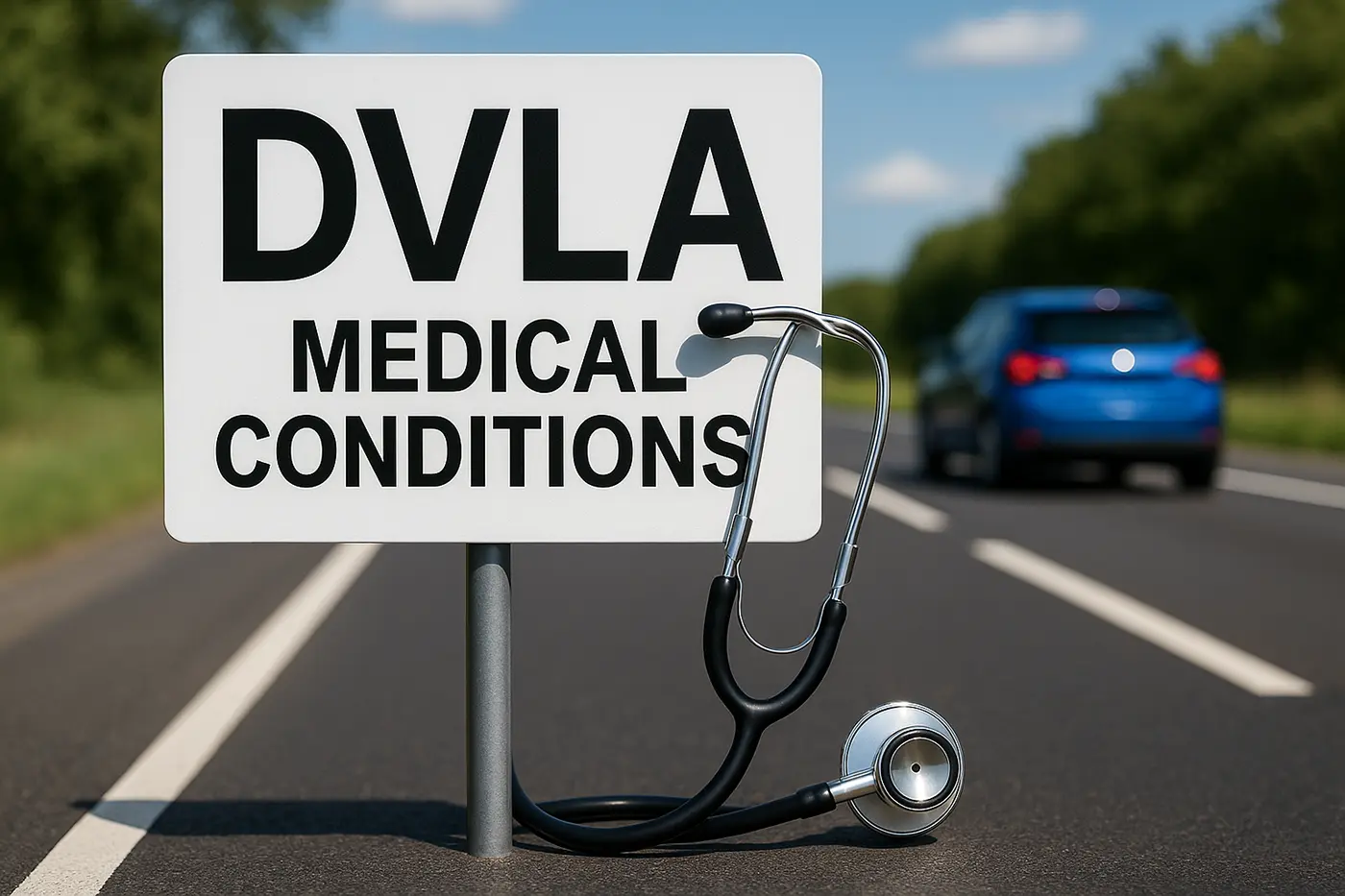
For millions across the UK, the ability to drive is a vital part of daily life. Alongside that freedom comes a responsibility to ensure road safety, not only for yourself, but for passengers, pedestrians, cyclists, and other drivers.
Most motorists are used to thinking about vehicle safety: MOTs, tyre checks, keeping lights in good order, and following road rules. But, the ability to operate a vehicle safely relies on a number of skills working together. Good vision, awareness of surroundings, physical control, clear thinking and reliable reaction times are all essential. A health change can affect one or more of those factors.
This guide sets out clear information to help you understand which medical conditions need to be reported, and how the process works. It also explains the consequences of not reporting and offers practical steps for staying safe and compliant.
What must be reported and when?
You must notify the DVLA if you develop a medical condition that could affect your ability to drive safely, or if an existing condition changes in a way that may affect your driving.
This applies whether you already hold a licence, are renewing it, or are applying for one for the first time. It is important to act promptly, rather than wait to see whether symptoms settle.
The DVLA provides an official online resource where you can check medical conditions and how to report them:https://www.gov.uk/driving-medical-conditions
Some of the most common notifiable medical conditions include:
-
Diabetes treated with insulin
-
Sleep apnoea and sleep-related conditions causing daytime tiredness
-
Epilepsy
-
Episodes of fainting or blackouts (syncope)
-
Heart conditions including arrhythmias, pacemakers or heart failure
-
Stroke or transient ischaemic attack (TIA)
-
Significant vision problems including glaucoma or serious cataracts
-
Certain mental health conditions where symptoms impact perception, awareness, or judgement
This list is not exhaustive. There are many other conditions that may need to be declared, depending on severity and symptoms. For that reason, it is wise to consult your GP or specialist if you are unsure whether disclosure is necessary.
How the DVLA responds when you notify them
People often worry that reporting a condition will automatically bring a driving ban. In reality, the DVLA’s approach prioritises fairness, medical evidence and public safety. Many people who notify the DVLA continue to drive.
When you report a condition, DVLA may:
-
Request medical reports from your GP or consultant
-
Ask you to complete a medical questionnaire
-
Require a medical examination or eyesight check
-
Arrange a driving assessment where needed
In some cases, the DVLA may grant a short-term licence lasting one, two or three years. These licences allow you to continue driving while health is reviewed periodically. This method protects road users while supporting independence where possible.
If medical evidence confirms that it is safe to do so, you may be able to drive while your case is under review. Always check with your doctor first, and follow any medical advice they give regarding driving.
What to expect from the assessment process
The DVLA does not make assumptions. Decisions are based on healthcare information and practical evidence. Your GP or consultant may be contacted to provide details about your condition, treatment and stability.
If symptoms are stable and managed effectively, many drivers face no restrictions beyond occasional review. In more complex situations, a driving assessment might be recommended to ensure that control, reaction times and awareness remain sufficient for road safety.
Drivers are also sometimes issued licences with specific medical recall dates. These reviews can offer reassurance that you remain fit to drive over time.
Importantly, your medical team and the DVLA work from a shared aim: maintaining your mobility while ensuring you can drive safely.
Driving while your condition is being reviewed
In many situations, you may continue to drive during the DVLA review period if your doctor confirms you are safe to do so, and you meet the criteria published on GOV.UK.
There are situations where driving must stop temporarily, for example, during early treatment for certain neurological or cardiac conditions, or after specific medical events such as a seizure. Your clinician will guide you.
Choosing caution and taking a short break from driving when necessary protects your safety and your licence.
Failing to notify the DVLA
Not reporting a notifiable medical condition is an offence. The consequences can be significant:
Even more importantly, failing to report creates a risk of harm to you and others on the road. The duty is legal, but it is also ethical.
The notification process exists to protect drivers, passengers and the public, not to penalise those acting responsibly.
How your health declaration affects insurance
When applying for or renewing vehicle insurance, you must disclose medical conditions that impact driving ability. This is part of the information insurers use to assess risk and ensure the correct level of cover.
If a medical condition that affects driving is not disclosed, insurers may decline to pay a claim, leaving you personally responsible for costs after an incident
Insurance is designed to protect you. Declaring relevant medical details helps maintain that safety net and avoids difficulties later.
If you are ever unsure whether your condition affects insurance requirements, it is sensible to seek clarification. Good communication avoids confusion and builds long-term confidence.
Reducing driving risk when managing a medical condition
There are practical steps that help maintain driving safety and confidence:
-
Follow treatment plans and attend scheduled medical appointments
-
Speak to your clinician if symptoms change or new medications are prescribed
-
Take regular breaks on long journeys to prevent fatigue
-
Avoid driving when unwell, overtired or experiencing symptom flare-ups
-
Make sure glasses or contact lenses prescriptions are current
-
Keep medication for emergency management available if appropriate (e.g., for diabetes)
Many of these habits are simple and routine. They support health and provide reassurance for you and others.
Temporary changes in health
Not all health events are long-term. After surgery, during certain treatments, or when adjusting to new medication, driving may not be suitable for a brief period.
Pausing driving when necessary is a responsible step, not a loss of independence. Most people return to the road with confidence once their medical team confirms it is appropriate.
Medication and safe driving
Certain medicines may cause drowsiness, dizziness or reduced alertness. Always check the patient information leaflet and speak to a pharmacist or GP if you're unsure.
Even everyday medications occasionally affect people differently. If you notice side effects that impair concentration or judgement, it is wise to avoid driving until you have medical guidance.
Listening to your body and acting responsibly ensures continued safety and legal protection.
Vision and driving fitness
Vision plays a central role in road awareness. UK law sets minimum standards for eyesight at the wheel. If you experience changes in eyesight, seek advice promptly. Early optometry checks often provide reassurance and help detect issues before they affect driving.
Good visibility underpins safe travel — and proactive checks give long-term confidence.
Medical changes need not signal the end of independent driving. Many people continue safely with appropriate treatment, responsible self-management, and open communication with health professionals and the DVLA. For more guidance, visit the official DVLA medical conditions and driving page here: https://www.gov.uk/driving-medical-conditions









